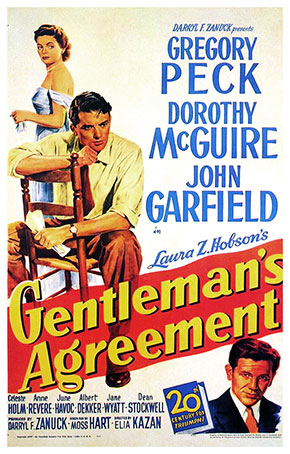
Baseball's Active Leaders, 2023
What Trump Said When About COVID
Recent Reviews
Everything Everywhere All at Once (2022)
Black Panther: Wakanda Forever (2022)
Doctor Strange in the Multiverse of Madness (2022)
Spider-Man: No Way Home (2021)
The Cagneys
A Midsummer Night's Dream (1935)
Something to Sing About (1937)
Angels with Dirty Faces (1938)
A Lion Is In the Streets (1953)
Man of a Thousand Faces (1957)
Never Steal Anything Small (1959)
Shake Hands With the Devil (1959)
Gentlemanís Agreement (1947)
Fittingly, when I finished watching Gentleman's Agreement, the first thing I saw on television was one of those public service messages from, I believe, NBC. The type where network stars tell kids that drugs are uncool. This particular ad featured two actors from the show "Third Rock from the Sun" who scolded parents who told racist jokes in front of their kids. It underscored the fact that, for all the progress and regress we've made on racism in the last 50 years, our media message hasn't changed much. It's still simple. It's still humorless. It's still a problem in those homes out there.
Written by:
Moss Hart
Directed by:
Elia Kazan
Starring:
Gregory Peck
Dorothy McGuire
John Garfield
Celeste Holm
Anne Revere
Dean Stockwell
Academy Award Nominations:
Best Actor (Peck)
Best Actress (McGuire)
Best Supporting Actress (Revere)
Best Screenplay
Best Editing
Academy Awards:
Best Picture
Best Director
Best Supporting Actress (Holm)
Perhaps I'm being unfair. Sure Gentleman's Agreement can be heavy-handed; sure Phil Green (Gregory Peck) comes off as a stiff, unlikeable prig at times; sure the movie grinds to a complete halt when actors look into the middle distance and intone; but there's still subtlety in some of Phil Green's uncompromising stands. If your child comes home in tears because other kids mistakenly think he's Jewish and pick on him, don't assure him that he's not Jewish — for that implies there's something wrong with being Jewish. Take the conversation to a deeper level.
Phil Green is a freelance writer who is brought to New York by a progressive magazine to write an article on anti-Semitism. For weeks he can't figure out how to do it. Finally, in an ironic twist on "passing," he decides to pass himself off as Jewish in order to get closer to the story.
Yet the brunt of the film doesn't focus on anti-Semitism so much as — what else? — love love love. Phil Green stodgily romances Kathy Lacey (Dorothy McGuire), upper-crust society gal, who, while not anti-Semitic herself, tends to abide (hating it all the while) the anti-Semitism of her peers. She doesn't try to provoke change the way Green does. This is the source of most of their arguments.
And, boy, do they argue. They fight and make up, fight and make up. Finally they break off their engagement. It's while talking with Green's Jewish buddy, Dave Goldman (John Garfield, always a pleasure to see), that Kathy realizes the error of her ways, and takes a step to provoke change: She lets Dave and his wife rent her cottage in Connecticut. This leads to a reconciliation between Lacey and Green, and the movie leaves them in mid-embrace, relieving the audience of having to watch them fight again in a week's time.
Why does Green wind up with this dull woman? He seems so much better suited for Anne Dettrey, the wise-crackin' fashion editor played by Celeste Holm, who won a supporting Oscar for her efforts. Did American women really identify with Kathy more than Anne?
Gentleman's Agreement won the Academy Award for Best Picture in a weak year for Hollywood film. It's a bit stagey — written by playwright Moss Hart — and preachy. Not to mention ironic. The first major film on anti-Semitism came out of one of the few studios (20th Century Fox) not run by a Jewish mogul.
—January 7, 2000/p>
© 2000 Erik Lundegaard







